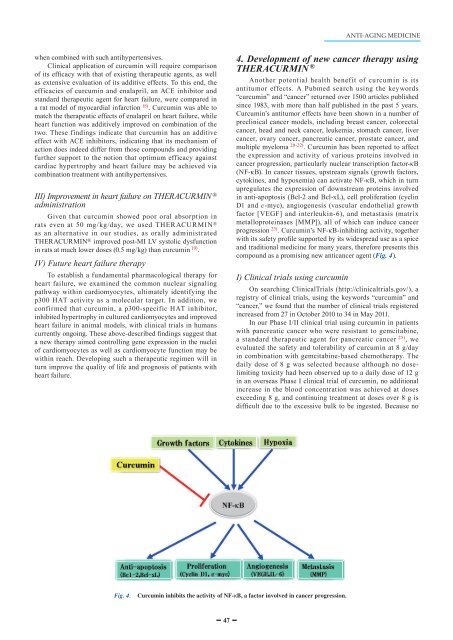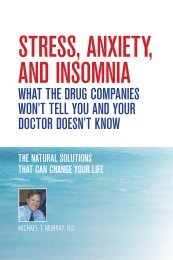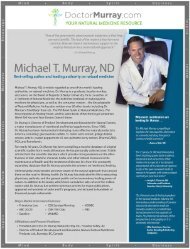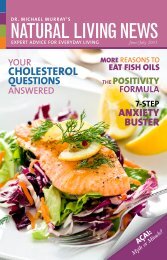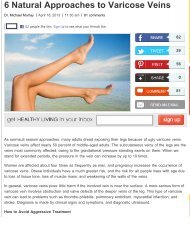Theracurmin Review - Dr. Michael Murray
Theracurmin Review - Dr. Michael Murray
Theracurmin Review - Dr. Michael Murray
Create successful ePaper yourself
Turn your PDF publications into a flip-book with our unique Google optimized e-Paper software.
Clinical Application of “Curcumin”, a Multi-Functional Substance<br />
when combined with such antihypertensives.<br />
Clinical application of curcumin will require comparison<br />
<br />
as extensive evaluation of its additive effects. To this end, the<br />
efficacies of curcumin and enalapril, an ACE inhibitor and<br />
standard therapeutic agent for heart failure, were compared in<br />
a rat model of myocardial infarction 18) . Curcumin was able to<br />
match the therapeutic effects of enalapril on heart failure, while<br />
heart function was additively improved on combination of the<br />
two. These findings indicate that curcumin has an additive<br />
effect with ACE inhibitors, indicating that its mechanism of<br />
action does indeed differ from those compounds and providing<br />
further support to the notion that optimum efficacy against<br />
cardiac hypertrophy and heart failure may be achieved via<br />
combination treatment with antihypertensives.<br />
III) Improvement in heart failure on THERACURMIN ®<br />
administration<br />
Given that curcumin showed poor oral absorption in<br />
rats even at 50 mg/kg/day, we used THERACURMIN ®<br />
as an alternative in our studies, as orally administrated<br />
THERACURMIN ® improved post-MI LV systolic dysfunction<br />
in rats at much lower doses (0.5 mg/kg) than curcumin 19) .<br />
IV) Future heart failure therapy<br />
To establish a fundamental pharmacological therapy for<br />
heart failure, we examined the common nuclear signaling<br />
pathway within cardiomyocytes, ultimately identifying the<br />
p300 HAT activity as a molecular target. In addition, we<br />
confirmed that curcumin, a p300-specific HAT inhibitor,<br />
inhibited hypertrophy in cultured cardiomyocytes and improved<br />
heart failure in animal models, with clinical trials in humans<br />
<br />
a new therapy aimed controlling gene expression in the nuclei<br />
of cardiomyocytes as well as cardiomyocyte function may be<br />
within reach. Developing such a therapeutic regimen will in<br />
turn improve the quality of life and prognosis of patients with<br />
heart failure.<br />
4. Development of new cancer therapy using<br />
THERACURMIN ®<br />
Another potential health benefit of curcumin is its<br />
antitumor effects. A Pubmed search using the keywords<br />
“curcumin” and “cancer” returned over 1500 articles published<br />
since 1983, with more than half published in the past 5 years.<br />
Curcumin’s antitumor effects have been shown in a number of<br />
preclinical cancer models, including breast cancer, colorectal<br />
cancer, head and neck cancer, leukemia, stomach cancer, liver<br />
cancer, ovary cancer, pancreatic cancer, prostate cancer, and<br />
multiple myeloma 20-22) . Curcumin has been reported to affect<br />
the expression and activity of various proteins involved in<br />
<br />
<br />
<br />
upregulates the expression of downstream proteins involved<br />
in anti-apoptosis (Bcl-2 and Bcl-xL), cell proliferation (cyclin<br />
D1 and c-myc), angiogenesis (vascular endothelial growth<br />
factor [VEGF] and interleukin-6), and metastasis (matrix<br />
metalloproteinases [MMP]), all of which can induce cancer<br />
progression 23) <br />
<br />
and traditional medicine for many years, therefore presents this<br />
compound as a promising new anticancer agent (Fig. 4).<br />
I) Clinical trials using curcumin<br />
On searching ClinicalTrials (http://clinicaltrials.gov/), a<br />
registry of clinical trials, using the keywords “curcumin” and<br />
“cancer,” we found that the number of clinical trials registered<br />
increased from 27 in October 2010 to 34 in May 2011.<br />
In our Phase I/II clinical trial using curcumin in patients<br />
with pancreatic cancer who were resistant to gemcitabine,<br />
a standard therapeutic agent for pancreatic cancer 25) , we<br />
evaluated the safety and tolerability of curcumin at 8 g/day<br />
in combination with gemcitabine-based chemotherapy. The<br />
daily dose of 8 g was selected because although no doselimiting<br />
toxicity had been observed up to a daily dose of 12 g<br />
in an overseas Phase I clinical trial of curcumin, no additional<br />
increase in the blood concentration was achieved at doses<br />
exceeding 8 g, and continuing treatment at doses over 8 g is<br />
<br />
Fig. 4. Curcumin inhibits the activity of NF-κB, a factor involved in cancer progression.<br />
47


